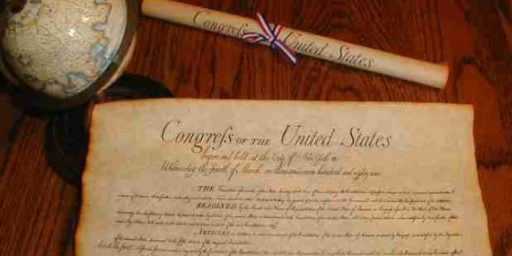Subtleties of Arabic Language
John Burgess points out that “a single Arabic word can have six pages’ worth of definitions.”
Not only does that have some significant implications for the interpretation of the Koran, the context of the observation, but it would seem to make diplomacy more problematic as well. Precise use of words is essential to negotiation; it would seem near impossible to achieve common understanding with that much flexibility.






Boy! This is the most insightful thing I’ve read in years! Language is imprecise!
This is Linguistics 101–Arabic is no different than any other language in this regard.
Almost as frequently in state diplomacy, convenient ambiguity is essential to negotiation. Viz. UN Resolution 1441 for just a single example.
Also, what’s the Arabic word for “heap” and how many grains are in one?
To me, it’s a bit disingenuous to say that “a single Arabic word can have six pages’ worth of definitions.” I obviously haven’t seen every page of every Arabic dictionary, but I’ve never seen anything that might approach this extent.
And further, the structure of the Arabic language means that Arabic dictionaries are put together differently from English ones. Most words in Arabic stem from a three-letter root; consequently, entries tend to be based on those root words (verbs). Beyond that, there are up to ten forms that can be used to build more verbs, which modify or specify additional meanings.
Which is not to say that there aren’t nuances that are difficult, if not impossible, for the non-native Arabic speaker to understand. But Mr Burgess’s statement that it’s because a word’s definition can span six pages sheds no light on the subject.
How many pages would it take to define exactly how the words “liberal” and “conservative” are used in contemporary American parlance?
Actually, I was citing a NY Times article that made that observation. Boyd is right that due to its triliteral nature, Arabic works differently from English. (There are 12, and arguably 13 forms a verb can take, however, not just 10, though many verbs do not use all forms.)
The NYT reporter, Neil MacFarquhar, was quoting someone who was specifically pointing to the Lane dictionary (Lane died before completing this 19th C. opus, but it’s mammoth nonetheless). That dictionary has the six pages for ‘daraba’. Most current dictionaries have a paragraph for the root and its usual forms, then a list of nouns and adjectives derived from the root.
Translation is a difficult job, particularly when it comes to diplomatic translations. State Dept. has an office (Office of Language Services, the last time I looked) that does nothing but translations and managing the official interpreters used by the USG. It can take weeks or months before a final, agreed translation is completed for even a two-page document.
That office was rather put out when USIA was rolled into State in 1999 and they discovered that USIA did same-day translations of speeches. USIA’s mission was to get the news out, ASAP. It served no useful purpose to have the transcript of a speech come out even two days after the event. The translations were not perfection, but they sufficed for media needs.
Arabic is one of the tougher languages. You can get not only the lengthy dictionary entries noted in the NYT piece, but also a lot of contradictory meanings, far more than in any language I’ve worked in. English has a few, like ‘cleave’, but they’re rare.
Arabic also has the added ‘benefit’ that no Arabic word is considered archaic or obsolete. If it was once used, it can be used again.
The student of Arabic joke is that every Arabic word has at least four meanings:
There’s more than a kernel of truth in that ‘joke’.